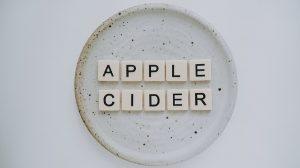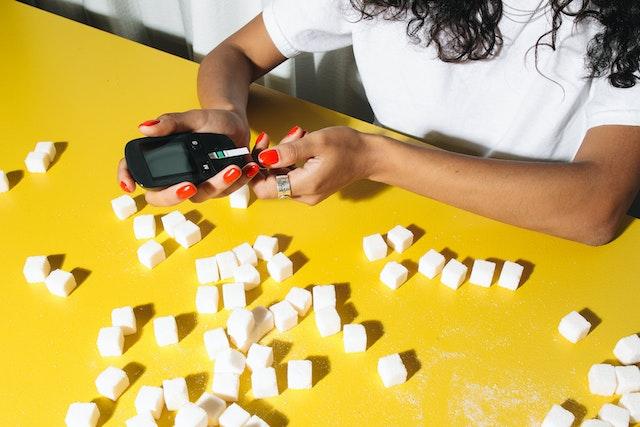
Can Apple Cider Vinegar Lower Blood Sugar Immediately?
A significant improvement in blood glucose levels was noticed 30 minutes after consumption of apple cider vinegar by a group that used it on a short-term basis.
Over the years, folk medicine has favored apple cider medicine. Additionally, there have been multiple claims made by persons using it for its supposed advantages.
Apples are chopped, covered with water, and left at room temperature until the natural gas ferments and turn into ethanol to produce apple cider vinegar.
Bacteria then transform this alcohol into acetic acid. In the cider, “mother” strands will start to form.
These are frequently the subject of health claims and are strained out of certain products but not others. The following batch of cider can also be made using the “mother,” if desired.
Apple Cider Vinegar Nutritional Value
Apple cider vinegar does not have a significant quantity of vitamins, minerals, or even calories if you look at the nutritional fact label.
This is because the potential health benefits of apple cider vinegar are found in substances that do not form part of the standard nutritional label.
The acetic acid which forms during fermentation is apple cider vinegar’s claim to fame. There are multiple health benefits to acetic acid.
Raw apple cider also contains the following:
• Natural probiotics (friendly bacteria). This will help boost your immune system and gut health.
• Antioxidants. It will help in preventing any damage to your body’s cells.
But will apple cider vinegar really help you control blood sugar?

There is proof that fermented foods, including apple cider vinegar that contains lactic or acetic acid, can lower blood sugar levels by assisting the liver in storing glucose.
As a result, the body produces and absorbs glucose at a slower rate.
You should dilute 1 – 2 tablespoons of apple vinegar cider in a glass of water if you wish to consume it.
If you want the best and the greatest impact on your blood sugar, you should drink it just before bedtime or before meals.
Apple cider vinegar can cause stomach irritation or damage your tooth enamel. Therefore, you should not consume undiluted apple cider vinegar just like with most kinds of vinegar.
Cider made from apples is another useful cooking component. Therefore, you can use apple cider vinegar in multiple items such as salad dressings, marinades, sauces, and soups. Besides, multiple types of fish and meat work well with apple cider vinegar.
The distilled kinds of apple cider vinegar are the ones that people are most likely to see for sale. This variety of apple cider vinegar is colorless and transparent.
Side Effects of Apple Cider Vinegar
Despite apple cider vinegar having multiple benefits to your health, there are certain side effects that may come along especially if you do not use it correctly.
Some of the side effects of apple cider vinegar include:
• When your tooth enamel erodes you can never get it back. Apple cider vinegar is high in acidity. The acidity of the apple vinegar cider is likely to erode your enamel.
• If you drink apple cider vinegar straight it can easily damage your esophagus.
Watering down the apple cider vinegar is a great way of reducing its acidity and preventing problems such as enamel erosion and damage to your esophagus.
You can water down your apple cider vinegar by adding a tablespoon to a mug of warm water.
Other possible side effects of apple cider vinegar include the following:
• Lower potassium levels. Hypokalemia is a condition caused by low potassium levels. If you have low potassium levels in your body, it is advisable for you not to use it since it may worsen your condition.
• Interaction with medicines. Some medicines, such as diuretics and insulin, can interact with apple cider (water pills). Therefore, it is advisable that you ask your doctor if it is safe for you to use apple cider vinegar if are taking any medications.
• Nausea and vomiting. Some folks can’t stand apple cider vinegar’s taste or acidity, very literally. Therefore, you should stop using apple cider vinegar if it makes you feel sick.
Availability
Additionally, you can get apple cider vinegar as pills or gummies. There is no recommended dosage, so read the product’s instructions carefully or ask your doctor how much is safe for you. Look for a company that has received a third-party endorsement.
Takeaway
You may want to consider consuming diluted apple cider vinegar if you have type 2 diabetes since scientists believe it is safe to drink.
Additionally, drinking apple cider vinegar may be beneficial to your body when it comes to helping you control your blood sugar levels.
However, scientific evidence supporting the use of apple cider vinegar helps in controlling blood sugar levels is little. Therefore, using apple cider vinegar or any other isolated dietary change to be a quick fix for diabetes should not be considered.
Some of the most effective methods of controlling diabetes that you can use include eating a high-fiber diet containing the correct amount of carbohydrates, protein, and healthful fat. You should also do physical exercise regularly.
Is apple cider vinegar better than other types for blood sugar control?
Apple cider vinegar is the type of vinegar that has been studied by scientists most often for reducing blood glucose levels. However, it is believed that other types of vinegar have the potential to act similarly in the body according to researchers.
All vinegar contains acetic acid, which is the element that scientists think has an impact on managing blood sugar, cholesterol, and weight.

Without mentioning apple cider vinegar specifically, some research employs vinegar solutions. For example, one study showed that a 30 milliliter(ml) vinegar solution that contained 6 percent acetic acid had positive effects on glucose and lipid metabolism.
Based on acetic acid concentrations and the impact of that specific component on blood sugar, vinegar should help improve these levels theoretically.
The majority of food vinegar variants have an acetic acid content of 4–7%. To verify the advantages and outcomes of various kinds of vinegar, scientists must do additional investigation.
FAQ:
Does vinegar lower blood sugar quickly?
The rate at which your stomach empties the food you have eaten into the small intestine is slowed down by the acetic acid in vinegar.
This in turn provides the body more time to eliminate glucose from circulation and inhibits the breakdown of carbohydrates. In the end, this lessens the regular blood sugar increase following a meal.
How much apple cider vinegar do I take to lower my blood sugar?
It is interesting to note that only a tiny amount of apple cider vinegar is required to produce these results.
It has been demonstrated that taking four tablespoons (20 ml) of apple cider vinegar before meals dramatically lowers blood sugar levels after meals.
Does taking apple cider vinegar before bed lower blood sugar?
The best times to drink apple cider vinegar for blood sugar control are shortly before meals and right before bed.
For instance, consuming 2 tablespoons (30ml) of apple cider vinegar at bedtime for two days lowered fasting blood sugar levels by as much as 6% in a study of persons with type 2 diabetes.
Should I drink apple cider vinegar before or after my meal?
Consuming apple cider vinegar on an empty stomach is the best way to take it. Vinegar might lose some of its potency when you eat certain foods and drinking vinegar before meals help your body metabolize food more quickly.
Waiting for at least 20 minutes after consuming the apple cider vinegar before eating anything is recommended by experts.
How much apple cider vinegar should you drink a day for diabetes?
You should drink around two (2) spoons every day. Never drink it straight; always dilute it with water, seltzer, or tea, or include it in your food. Consume no more than 2 tablespoons daily.
What happens when you drink apple cider vinegar every day?
Lower blood triglycerides, smaller waist circumference, reduced belly fat, and weight loss are some of the results of consuming apple cider vinegar every day according to a study published in Bioscience, Biotechnology, and Biochemistry.
What is the best time to take apple cider vinegar for diabetes?
Takin 20 grams (20 ml) of apple cider vinegar diluted in 40ml of water, with 1 teaspoon of saccharine, could lower your blood sugar after meals according to research from 2004.
Additionally, taking apple cider vinegar before bed helped moderate blood sugar upon waking accordioning to another study from 2007.
How can I stabilize my blood sugar overnight?
Checking your blood sugar (or CGM) before is a great way of stabilizing your blood sugar overnight. Additionally, eating lots of food close to bedtime should be avoided.
Low-carb, early dinners without any after-dinner snacks are crucial for many diabetics to stay in range overnight. To cover your evening meal, you could choose to eat less at night and increase your basal insulin intake.
How long should I wait to eat after taking apple cider vinegar?
Yes. You can drink diluted apple cider vinegar on an empty stomach. In fact, it is the recommended way to take apple cider vinegar. Just wait about 20 minutes or so after drinking apple cider vinegar to eat.
Can apple cider vinegar damage your kidneys?
Your kidneys shouldn’t be harmed by apple cider vinegar.
What medications can you take with apple cider vinegar?
A few drugs and apple cider vinegar may not interact well.
Some medicines for diabetes. Those who consume vinegar while taking insulin-stimulating drugs run the risk of having dangerously low potassium or blood sugar levels.
Digoxin (Lanoxin). Your blood potassium levels drop when you take this drug.
Certain diuretic drugs.
Does apple cider vinegar interfere with blood pressure medication?
Continue taking any prescription drugs, and adhere to any suggested schedules. More research is required, but apple cider vinegar may help decrease blood pressure. However, it doesn’t seem that using apple cider vinegar moderately carries any hazards.
When should you not take apple cider vinegar?
If you have a sluggish stomach, you should avoid drinking apple cider vinegar.
Additionally, drinking ACV can affect the muscles of your stomach if your digestive system is slow.
Limiting the intake of apple cider vinegar to one teaspoon a day mixed with water or sprinkled on the salad is advisable in such cases or you should avoid it completely.
Caution:
To maintain healthy blood sugar levels, do not use apple cider vinegar by yourself. Maintain a healthy diet and exercise routine to treat or prevent diabetes.
Before increasing your intake of any type of vinegar you should talk to your doctor if you are currently taking blood-sugar-lowering medications.

